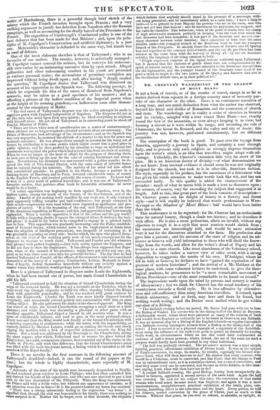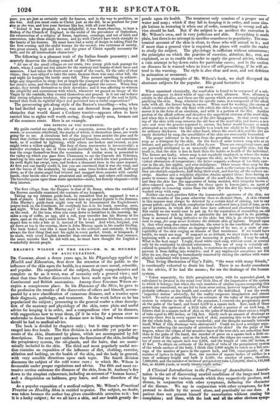DR. CHEEVER'S WANDERINGS IN THE SHADOW OT MONT BLANC Is
not a book of travels, or of the results of travel, except in so far as matter derived from sojourn in a foreign country must of necessity par-
take of one character or the other. There is no continuous narrative of
a long tour, and not much deduction from what the author has observed, beyond his dread and dislike of Romanism and the connexion of church
and state. The wanderings are in reality a series of sketches in Geneva and its vicinity, mingled with a tour round Mont Blanc—not exactly round the foot of the mountain, or even always keeping it in view, but forming a circuit as it were within its range, and including the vale of Chamouny, the Great St. Bernard, and the valley and city of Aoste: this journey was not, however, performed continuously, but on different occasions.
The conception of the book is good. To pass over the voyage from America, apparently a journey in Spain, and certainly a tour through Italy, and to present only such subjects as strongly impress themselves upon the writer's mind, is an idea that travellers might adopt with ad- vantage. Unluckily, Dr. Cheever's execution falls very her snort of hia plan. He is an American doctor of divinity—of what denomination we do not know: from internal evidence it should seem he was not originally designed fbr the church, but took to it in after-life, American fashion. His style, especially in his preface, has the smartness of a fittdrateur who has given his whole attention to make words look like wit, and has not succeeded badly. To this quality is added the characteristic of the preacher : much of what he meets with is made a text to discourse upon ; the sermon, of course, very far exceeding the subject that suggested it in length. Add to this, that great part of the book consists of description,— Dr. Cheever pours out his delight of beauty in a flowery and fluent. style—and it will readily be believed that words predominate in Wan- derings iit the Shadow of Mont Blanc : half would have been better than the whole.
This exuberance is to be regretted: for Dr. Cheerer has an enthusiastic taste for natural beauty, though a shade too intense ; and be describes it with effect. He is also a stout pedestrian, albeit an invalid, without any objection to rough it in a style that most tourists would shrink from.; his excursions are interestingly told, and would be more attractive were it not for the discourses attached to the facts. His profession also gave him a pursuit; and his account of the state of religion and its mi- nisters at Geneva will yield information to those who will distil the know- ledge from the words, and allow for the writer's dread of Popery and his aversion to a state church. Like most churchmen of the Voluntary school, however, he takes rather a narrow view of other sects, with a strong disposition to exaggerate the merits of his own. D'Aubigud, whom hi fell in with at Geneva, he declares to have "gained the reputation of the greatest of modern historians" ; and the arrival of a Mr. Iltddane at the same place, with some volunteer lectures he undertook to give the theo- logical students, he pronounces to be "a most remarkable movement of Divine Providence—one of' the most remarkable to be found on record."
The impressions made upon the mind by persons and scenery is matter of idiosyncracy ; but we think Dr. Cheever has the usual tendency of his, countrymen towards a florid style. He is less offensive by obtrusive- ness and self-sufficiency than many American travellers. A remark upon British aristocracy, and so forth, may here and there be found, but nothing worth noting ; and the Doctor soon melted when be got within ear-shot of a Bishop.
"The Sabbath evening before we parted, Mr. Bacon had gone with me to hear the Bishop of Cashel. The service was in the dining-ball of the Hotel de Bergues, a fashionable resort, where there were gathered as many of the votaries of rank and wealth from England as ordinarily are to be found in Geneva on any Sabbath.. It was an unusual step for a Bishop of the English Church—a regular conventicle —a Sabbath evening extempore sermon from a Bishop in the dining-hall of the hotel! I love to record it as a pleasant example of a dignitary of the Establish- ment using the influence of his rank to do good, to gather an assembly for hearing God's word, in circumstances where no one else could have commanded an audience of half-a-dozen persons; where, indeed, the use of the roomier such a. purpose would hardly have been granted to any other individuaL "The hall was perfectly crowded. The preacher's sermon was a most simple, faithful, practical, affectionate exhibition of Divine truth. It was on the subject of Paul's conversion, its steps, its marks, its results, especially the blessed tern- per—' Lord, what wilt thou have me to do?' He showed that every creature, who would be a Christian, must be converted, just like Paul; that the change in Paul was no extraordinary case, as it is sometimes viewed, but a case of conversion; and that they must every one be converted, and become as little children, in like man- ner, saying, Lord, what wilt thou have me to do? "A second Sabbath evening, the good Bishop, baring been unexpectedly de- tained in Geneva, appointed a second service of the same kind. Again the hall was crowded. He took for his subject this time, the conversion of that sinfia woman who loved much because much was forgiven; and again it was a most unostentatious, straightforward, practical exhibition of the truth, plain, con- vincing, humbling, direct to the conscience and the heart. Every person, he told his hearers needed needed conversion by the grace of Christ, just as much as this woman. Without that grace, be you ever so refined, so amiable, so upright, ao
pure, you are just as certainly unfit for heaven, and in the way to perdition, as she was. And you must come to Christ just as she did, be as penitent for your sins as she was, and love your Saviour like her, with all your heart. "Indeed it was pleasant, it was delightful, it was heart-cheering, to bear a Bishop of the Church of England, in the midst of the prevalence of Oxfordism, the resurrection of a religion of forms, baptisms, crossings, and not of faith and conversion, take these simple themes, and go with Christ's bare truth straight to the hearts of his bearers. He must have had a unity of design in taking Paul for the first evening and the sinful woman for the second; two extremes of society, two great sinners, high and low; and the grace of Christ equally necessary for both, and for all intermediate characters."
The following is a pleasant trait of the Italian female peasantry ; and scarcely deserves the closing remark of Dr. Cheever.
"At one of the small villages on our route, two young girls took passage for Aoste, whom I could not but admire for the modesty and beauty of their faces and manners. I had taken the front-seat or coupe of the coach, for the sake of clear vision; they were obliged to take the same, because there was none other left, the cool night air keeping the inside seats full. They seemed unwilling to acknow- ledge any disposition to sleep; but at length the youngest of the two fell asleep on her sister's arms, and the elder reclined and slept against the corner. When they awoke, they betook themselves to their devotions; and it was affecting to witness the simplicity and earnestness with which, whenever we passed an image of the Virgin by the roadside, they crossed themselves and prayed. Is it not sad to have this strong religious tendency, this yearning after the repose of the soul in faith, turned thus from its rightful object and perverted into a sinful superstition?" The persevering get-along style of the Doctor's travelling—who, when he had decided upon a journey, was not deterred from pursuing it by obstacles that would daunt a Cockney tourist—appears often to have carried him to sights well worth seeing, though rarely seen, because out ,of the common route. Here is an example.
THE EFFECTS OF THE TOURMENTE.
My guide carried me along the side of a mountain, across the path of a tour- mente, or mountain-whirlwind, the marks of which, in themselves alone, are worth going far to see. A circuitous belt of the largest trees amidst the pine and fir fbrest that clothes the mountain, are stripped of branches, verdure, and sometimes bark, as if scathed by lightning, while others are broken and twisted, as you might twist a willow sapling. The fury of these tourmentes is inconceivable; a traveller overtaken by one of them would inevitably be lost; they would almost tear the crags themselves from the mountains. A similar scene is presented in the valley up which you pass from Chamouny to see the Cascade des Pelerines, marking in this case the passage of an avalanche, of which the wind produced by its swift flight has swept, torn, and broken a thousand trees in the same manner. At first you can hardly credit it, but you are convinced that it was the wind, and not the waves of the avalanche, by seeing some trees broken short off, half-way down, as if the storm-angel had twisted and snapped them asunder with careful hands, close beside other trees prostrated and stripped, and others still standing. Thetraveller gazes upon these mute spectacles—mute, but fiercely eloquent—with deep interest.
MURRAY'S HAND-BOOR.
The first village from the Hospice is that of St. Remy, where the sentinel of the Bureau carefully examined the contents of my knapsack. Taking up my crimson guide-book, he remarked that be supposed it was a book of prayer. I told him no, but showed him my pocket Epistle to the Romans. John Murray's guide-book might very well be denominated the Englishman's prayer-book on the Continent, for everybody has it in his hand, morning, noon, and nigh; What does Mr. Murray say? is the question that decides everything on the road. At the inns, when you come down to breakfast in the morning, be- sides a cup of coffee, an egg, and a roll, your traveller has his Murray at his plate, o at the day's route before him. If he is a genuine Irishman, you may
expect to take a bite at it, instead of his bread. And when, fatigued, you
sit down at tea in the evening, there is John Murray again in his scarlet binding. The book looked very like a mass-book to the sentinel; and certainly, it being always the first thing that met his sight in every pocket, trunk, or knapsack, if he made, with every English traveller that crossed the mountain that summer, the same mistake that he did with me, he must have thought the English a wonderfully devout people.



























 Previous page
Previous page